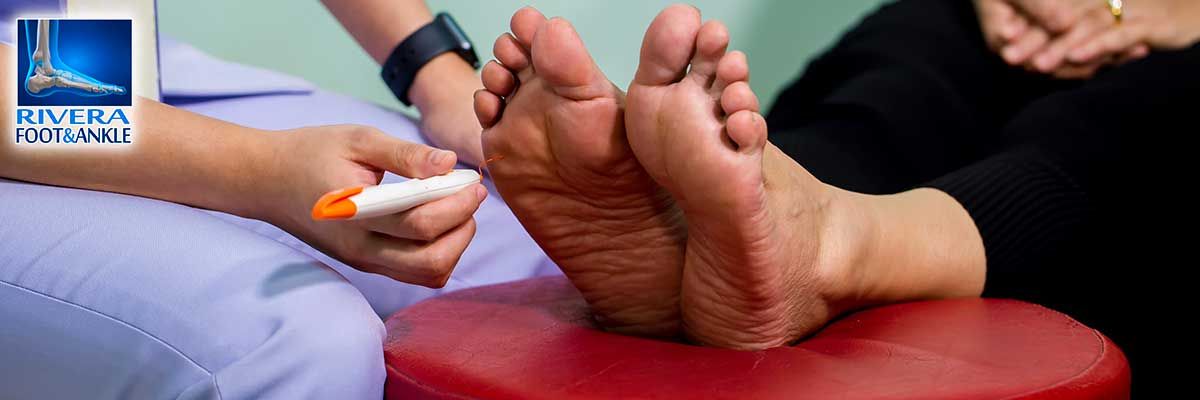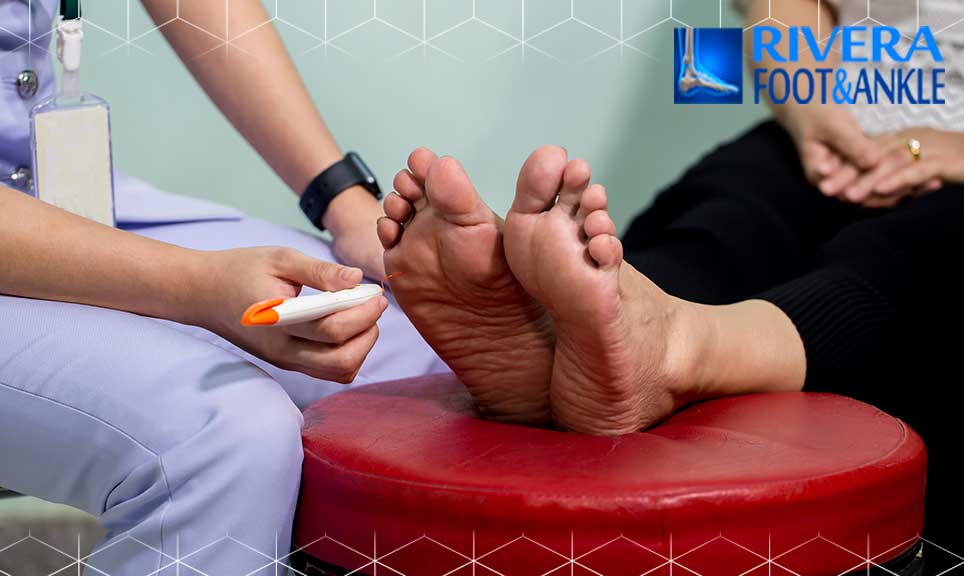
Advanced Foot & Ankle Specialist
Why Do People with Diabetes Need Foot Exams?
Overview
You must be vigilant in many areas of your health if you have diabetes. This includes making a habit of daily foot exams in addition to monitoring your blood glucose levels, eating a healthy and balanced diet, taking prescribed medications, and staying active.
Proper foot monitoring can reduce your chances of developing foot conditions that may result in serious complications. This involves daily self-exams and annual professional evaluations.
Why is a foot exam important?
Proper foot care for people with diabetes is vital to overall health. According to the Joslin Diabetes Center, 1 in 4 people with diabetes will develop a foot condition that requires intervention.
One condition that may lead to further complications in the feet is neuropathy. This is the result of nerve damage that causes difficulty or inability to feel your feet or other extremities.
Neuropathy is common in people with diabetes because high blood sugar damages the nerve fibers in your body.
Foot problems related to neuropathy can result in foot injuries that you won’t realize you have. A study in the Journal of Family Practice reports that up to half of people who have sensory loss from neuropathy may have no symptoms at all. This can cause further foot damage.
Other serious foot conditions that may develop in those with diabetes include:
- calluses
- ulcers
- infections
- bone and joint pain
- deformities
- vascular disease
- breakdown of skin
- changes in skin temperature
Neglecting to care for your feet, or seek intervention for a developing condition, can lead to worsening symptoms and more serious treatments.
How to give yourself a foot exam
Those with diabetes must monitor their feet daily to maintain foot health. Basic aspects of a foot self-exam include looking for changes to the feet, such as:
- cuts, cracks, blisters, or sores
- infection
- calluses
- hammer toes or bunions
- changes in foot color
- changes in foot temperature
- redness, tenderness, or swelling
- ingrown toenails
- changes to the size or shape of the foot
If you have difficulty seeing your feet, try using a mirror to help you examine them, or ask a friend or loved one to help you. Daily foot monitoring can help reduce more complicated conditions that may develop because of diabetes.
When should you see a doctor?
Contact your doctor or podiatrist if you notice any changes to your feet. You shouldn’t treat abnormalities to your feet at home. Your doctor will evaluate the condition and conduct necessary tests to determine your diagnosis. Early diagnosis will reduce your risk of further complications.
Those with diabetes should also see their doctor annually for a preventative foot exam.
RIVERA FOOT & ANKLE: At Orlando H.Rivera DPM, our priority is to deliver quality care to informed patients in a comfortable and convenient setting. When you have problems with your feet, you need to turn to a podiatrist who listens and responds… an experienced doctor who knows the field and can effectively diagnose and treat your needs… a friendly physician who counsels you on the best ways to maintain and improve your health. Our physician(s) meet all these criteria. Plus, you benefit from a dedicated team of trained professionals who give you the individualized attention you deserve.

Advanced Foot & Ankle Specialist
Foot and Ankle, Dr. Orlando Rivera, Advanced Foot & Ankle Specialist, Foot and Ankle Podiatry, Houston Foot & Ankle Surgical, Treatment of Foot and Ankle, Foot & ankle specialists, Podiatrist in houston, podiatrist in houston, Orlando H.Rivera DPM, Houston Foot Doctor, Foot and Ankle Surgeon Houston, Ankle and Foot Specialist Houston, Podiatrist Houston, Foot Pain Houston.



